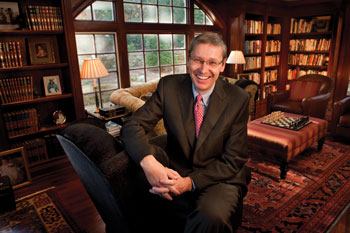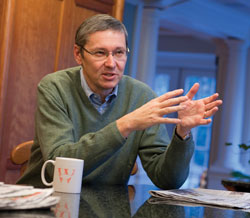Face to Face: An interview with N. Gregory Mankiw – Economic Outlook
Lisa Leslie Henderson writer
Brian Smith photographer
 It has been 25 years since Greg Mankiw began teaching economics at Harvard College, a position he continues to enjoy today. Over the years, Mankiw has worked inside and beyond those ivy-covered walls, most recently serving as Chairman of the Council of Economic Advisors under President George W. Bush and as a visiting fellow at the American Enterprise Institute. A keen observer of events, Mankiw is a regular contributor to myriad academic and policy debates; on any given day, you can find his thoughts on financial markets, monetary and fiscal policy, or economic growth in the popular press, academic journals, and on Squawk Box and other financial news media. His depth of knowledge, dry sense of humor, and ability to explain complex ideas in layman’s terms make him one of the top 100 business bloggers and a favorite Harvard professor—his introductory economics class, colloquially known as EC 10, is often the largest class at the college. Mankiw lives in Wellesley with his wife, three children, and their border terrier, Tobin.
It has been 25 years since Greg Mankiw began teaching economics at Harvard College, a position he continues to enjoy today. Over the years, Mankiw has worked inside and beyond those ivy-covered walls, most recently serving as Chairman of the Council of Economic Advisors under President George W. Bush and as a visiting fellow at the American Enterprise Institute. A keen observer of events, Mankiw is a regular contributor to myriad academic and policy debates; on any given day, you can find his thoughts on financial markets, monetary and fiscal policy, or economic growth in the popular press, academic journals, and on Squawk Box and other financial news media. His depth of knowledge, dry sense of humor, and ability to explain complex ideas in layman’s terms make him one of the top 100 business bloggers and a favorite Harvard professor—his introductory economics class, colloquially known as EC 10, is often the largest class at the college. Mankiw lives in Wellesley with his wife, three children, and their border terrier, Tobin.
WellesleyWeston Magazine: You have had a remarkable career both in the public and private sector. What is it about economics that piqued your interest?
Greg Mankiw: I first became interested in economics during my freshman year at Princeton. One of my friends was taking a microeconomics class; I started reading her textbook and found that I like economics, a lot. In many ways I am a prototypical economist. Economists share a couple of characteristics: they tend to be naturally better in math and science—economics is fairly quantitative—and they are generally more interested in public policy and social issues than in the substance of science. I have always been interested in politics—dinner conversation in my home often centered on what was happening locally and in Washington. But politics by itself seemed vague, random, and subjective. Economics appealed to me because it brought an analytic perspective to social policy questions.
WW: Where are we with respect to the US economy? Technically we pulled out of a recession last summer and the stock market is rallying, but policymakers continue to interject stimulus money into the economy, credit remains tight, and unemployment is quite high. How good or bad are we, really?
GM: People who study the aftermath of financial crises conclude that recovery typically tends to be slow; the general consensus is that this recovery is likely to be slower than most. One of the reasons is that the Federal Reserve is running out of ammunition. In 1982, the last very deep recession, the Fed had raised interest rates to slow inflation, but that meant that they had room to cut rates when they needed to get out of a recession. The Fed has cut interest rates as far as they can right now. They are doing other things, like buying mortgage-backed securities and commercial paper, but it is not clear how much extra oomph that provides. We are all in uncharted water here.
 WW: Have we seen the bottom?
WW: Have we seen the bottom?
GM: Most economists think we are close. The way things typically work is that there are leading and lagging indicators. Financial markets tend to lead and we have already seen a huge run-up in the stock market since last March. Then there is usually an improvement in GDP, which we are starting to see. The last to come are the labor markets. We have not seen any turn here, none. But the fact that the financial markets have come back in such a big way makes one hopeful that within the next six to twelve months the labor market will begin to look better.
That having been said, I take all economic forecasting with a grain of salt. We economists are notoriously bad at forecasting. To some extent that is because unexpected things happen. Economic forecasting is most useful for contingency planning: what should we do if this happens?
WW: What can we expect a fully recovered US economy to look like?
GM: Well, an interesting question is what the financial system is going to look like going forward. What kind of regulatory system are we going to put in place to minimize the possibility of this kind of thing happening again? I would never say “prevent” because I don’t think you can ever fully prevent these kinds of things. If you look at what happened in this financial crisis, there were a series of errors on lots of people’s part from regulators to private firms to individuals taking on greater mortgages that they could afford. No system can be fully foolproof. Should we require financial firms to have more capital to absorb losses? Should firms have to be smaller so that they are not “too big to fail”? Professional economists are still wrestling with these questions.
 WW: How necessary has the government stimulus been to the economy’s recovery?
WW: How necessary has the government stimulus been to the economy’s recovery?
GM: Obama’s economic team put out a report in January 2009 that stated that without the stimulus, unemployment would rise to about nine percent, but with the stimulus it would peak near eight percent. Today, unemployment is over ten percent. So, what do you make of that? Either the stimulus has been a failure or things were worse than we originally thought; unemployment might be even higher today if not for the stimulus. We can’t know for sure because this is not a controlled experiment. I am enough of a Keynesian to believe that the stimulus does, in fact, stimulate, although I probably would have emphasized tax reductions over government spending increases. I am nervous when the government spends a large sum of money quickly that it may not spend it wisely. I understand Obama’s rationale: perhaps tax cuts would not have stimulated a recovery quickly enough.
WW: Should they stop spending now?
GM: From a short-term perspective, the economy is still weak. The trick is balancing short-run considerations with long-run considerations. The long-run fiscal picture is very bleak. It was bleak before the current economic downturn because the impending retirement of the baby boom generation is going to put tremendous pressure on entitlement programs like Social Security, Medicare, and, to some extent, Medicaid. We were on an unsustainable path then and our current path is even more unsustainable. The Obama Administration has not realistically addressed the very big fiscal hole we will need to fill going forward.
WW: What will this bleak fiscal scenario look like for our children?
GM: Our children will pay vastly higher tax rates than we currently face. The alternative is to reduce spending, but the spending cuts that are necessary to maintain our current levels of taxation are politically untenable. If I had my druthers, I would raise the eligibility age for Social Security and Medicare, but that is a political non-starter.
It comes down to the classic economic question: what is the right trade-off between equality and efficiency? The more robust the social safety net that you have, the higher the taxes to pay for it. We are moving in the direction of a more robust safety net—that is what the health care bill is about. We are going to look more like Western Europe. Higher taxes blunt economic incentive and adversely affect economic growth, however. As a result, our kids will face less incentive to work than we have.
WW: What does that mean for US competitiveness?
GM: It will slow GDP growth. That’s not necessarily the end of the world. Facing higher tax rates, Europeans have developed a culture that is more leisure-based than ours; work doesn’t pay as well at the margin as it does here. But that is hardly a catastrophe. You don’t look around Paris and think, “Oh, these poor people,” but they are less well off than Bostonians.
It’s A Small World After All
WW: In your experience heading the Council of Economic Advisors, how much does economics really affect public policy?
GM: The Council has only an advisory function. It has no decision-making power over anything. My day started with a 7:30 am meeting every morning in the Roosevelt Room, the conference room right next to the Oval Office, with members of the White House senior staff. Everyone was fully prepared for the meeting, having already read the news of the day. This was quite a shock for an academic—no one at Harvard would ever dream of calling a meeting at 7:30 am!
I also met regularly with the Administration’s economic policy team—the head of the National Economic Council, the Secretary of the Treasury, the Commerce Secretary, and the Head of the Office of Management and Budget. We coordinated the economic policy effort with a goal of providing either a recommendation or a menu of options for the President to consider regarding the economic policy issues of the day. Several times a week we would meet with the President to discuss the pros and cons of our recommendations. Ultimately, he was the decision maker.
But that’s not the end of the story. When I went down to Washington, I thought the political constraints [on economic policy] would come through political advisors, people like Karl Rove, but they usually came from Legislative Affairs, the group that acts as a liaison between the President and Congress. Congress provides powerful political constraints. From the outside it often seems like there are only two teams in Washington: Republicans and Democrats. But it is really far more nuanced that. There is the Administration and the Congress; and within Congress, there is the Senate and the House; and there are coalitions within each of them. Everyone is looking over their shoulder trying to figure out what they can get passed; everyone is promoting their own agenda. It is very easy to get frustrated, thinking, “Gosh, it’s really terrible we can’t get our economic agenda through and we have all these great ideas.” But then you realize that these checks and balances are precisely the system for which the founding fathers were aiming.
WW: You teach EC 10, which often has 700 students enrolled each year. Is everyone at Harvard an economics major?
GM: No, we have roughly 250 economics majors every year at Harvard College. Some EC 10 students are economics majors, but many never take another economics course in their lives. I take it as a very special opportunity to help form these future voters’ ability to think through economic policy issues.
WW: Has your course syllabus changed much as a result of recent economic conditions?
GM: I don’t think as much as outsiders think. There is a temptation to think that all of economics has to be rewritten because of these catastrophic times. Yet a lot of the basic rules of economics—supply and demand and firms maximizing profit—are timeless.
What has changed is emphasis. Students want to hear more about the Depression today. A few years ago, the Great Depression looked like a distant topic in economic history; now it looks like it has interesting historical parallels. Leverage is another topic. It is not that no one has thought about the impact of leverage before; rather, it has become newly relevant to the world around us.
WW: You write one of the most popular business blogs. How did you get interested in blogging?
GM: That was sort of an accident. It started as a side effect of EC 10. I would read things in the newspaper and would forward them to my students if it related to something we were doing in class. Then other people, including professors at other schools that were using my textbook, asked to be on the e-mail list, so I just decided that it would be easier to have it in the public domain. Over time the content has evolved as the readership has broadened. I try to keep it somewhat light.
WW: What do you like to do when you are not thinking about economics?
GM: Deborah and I have three kids. I am a family guy, like my father.
What to brush up on your economics?
© 2010 Elm Bank Media


recent comments